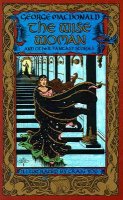 The Wise Woman: A Parable (also known as The Lost Princess, and as A Double Story) by George MacDonald (1875)
The Wise Woman: A Parable (also known as The Lost Princess, and as A Double Story) by George MacDonald (1875)
My project to read all of George MacDonald's books in chronological order (95 by 65 item #61) led me recently to The Wise Woman, and I can well see why C.S. Lewis classed it as one of MacDonald's very best stories, along with Phantastes, the Curdie books, The Golden Key, and Lilith. It's a delight through and through, and more than most fits my prime criterion for a good book: A good book inspires me to be a better person. I realize that distinction doesn't sound very impressive. I don't mean a moralistic book, or a book that tells me to be better; rather, one written in such a way as to provoke, deep within, both the desire to improve and the hope that improvement is not impossible.
The Wise Woman well deserves what Lewis said about the mythopoeic genre—at which MacDonald excelled:
[I]t produces works which give us (at the first meeting) as much delight and (on prolonged acquaintance) as much wisdom and strength as the works of the greatest poets. It is in some ways more akin to music than to poetry—or at least to most poetry. It goes beyond the expression of things we have already felt. It arouses in us sensations we have never had before, never anticipated having, as though we had broken out of our normal mode of consciousness and "possessed joys not promised to our birth." It gets under our skin, hits us at a level deeper; than our thoughts or even our passions, troubles oldest certainties till all questions are reopened, and in general shocks us more fully awake than we are for most of our lives.
Have I made it sound too intimidating? Never mind, then. It's short (116 pages), it's free on Kindle (under the title, A Double Story), and entirely grandchild-safe.


